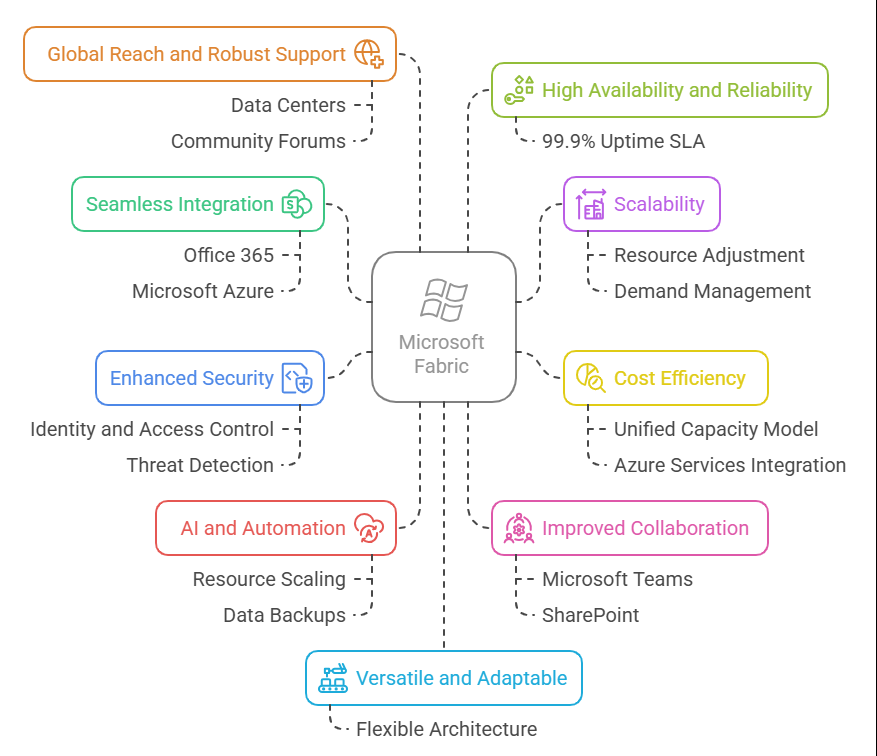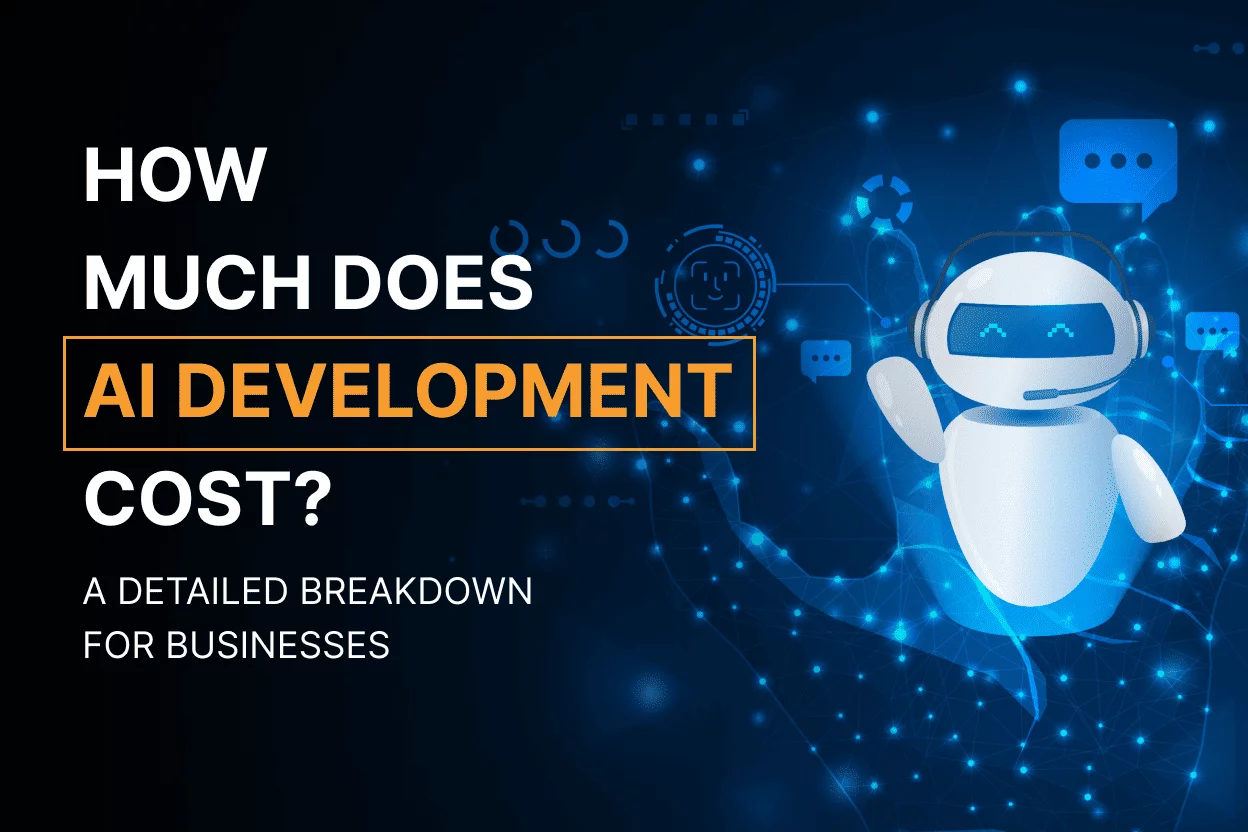Struggling to turn scattered data into real value? You’re not alone. Many businesses invest in data & business intelligence tools but still face delays, confusion, and rising costs. The global Business Intelligence software market is poised for significant growth, with projected revenue expected to reach USD 29.51 billion by end of 2025, the market is forecasted to expand further reaching an estimated value of USD 36.49 billion by 2030. That’s where Microsoft Fabric steps in. It enables teams to work smarter with connected tools, making data easier to manage, understand, and act on. As organizations modernize their tech stack, the future of Microsoft Fabric offers a unified foundation for data, analytics, and AI collaboration.
This article covers how Microsoft Fabric unifies data processes along with real-world use cases across industries.
Microsoft Fabric at a Glance
Microsoft Fabric is a powerful Software-as-a-Service (SaaS) analytics platform that brings together multiple capabilities in one place. It combines data lake management, data engineering, integration, data science, real-time analytics, and business intelligence into a single solution. Built to support the entire data lifecycle, it handles everything from data ingestion to insight delivery, aiming to simplify your analytics landscape.
In most organizations, different teams manage various aspects of data using separate platforms for warehousing, engineering, lakes, analytics, and science. This often leads to scattered systems, data silos, duplication of efforts, and increased costs.
Microsoft Fabric solves this by unifying all these functions under one platform. This makes it easier to manage data infrastructure, reduces complexity, and helps organizations operate more efficiently.
How Microsoft Fabric Simplifies Enterprise Workflows to Maximize ROI
Many organizations face challenges with fragmented workflows and rising operational complexity. Here’s how Microsoft Fabric simplifies these processes to help maximize ROI.

Seamless Integration
One of Microsoft Fabric’s standout strengths is its smooth interoperability with the broader Microsoft ecosystem, including tools like Office 365 and Microsoft Azure. This tight integration unifies the digital environment, simplifies workflows, and allows data and business applications to work together efficiently.
Scalability
Microsoft Fabric is built to grow and adapt with your business. Whether you’re a small startup or a large enterprise, the platform scales effortlessly to match your evolving needs. It enables you to adjust resources as needed, manage demand efficiently, and stay agile in a changing market. This ensures your business remains responsive and competitive.
Cost Efficiency
Microsoft Fabric eliminates the need for heavy upfront investment in hardware and software. Its unified capacity model, along with native integration with Azure services, allows organizations to manage costs effectively by paying only for what they use. This makes it an economical solution for businesses of any size.
Enhanced Security
Microsoft Fabric offers strong security capabilities to protect your data and applications. Features like identity and access control, threat detection, encryption, and compliance tools work together to ensure your organization’s sensitive information stays secure. In a digital world where security is critical, Fabric provides reliable protection.
AI and Automation
Microsoft Fabric seamlessly incorporates artificial intelligence and automation into everyday operations. It helps streamline workflows by automating routine tasks such as resource scaling and data backups. This efficiency is one of the reasons why many businesses consult a Microsoft Fabric consultant to implement the platform strategically.
High Availability and reliability
For businesses, downtime can be a serious disruption. Microsoft Fabric is built on Microsoft’s cloud infrastructure and offers a 99.9% uptime SLA, ensuring critical services remain reliably accessible.
Improved Collaboration
Microsoft Fabric supports seamless teamwork through tools like Microsoft Teams and SharePoint. It enables smooth communication and collaboration across departments, regardless of team members’ locations.
Versatile and Adaptable
Microsoft Fabric is designed to support a wide range of applications and workloads. Its flexible architecture makes it suitable for various industries and helps meet specific business needs effectively.
Global Reach and Robust Support
Microsoft Fabric features a global network of data centers, allowing businesses to deploy resources closer to their users. This reduces latency, improves performance, and ensures compliance with local data privacy regulations. It also offers extensive support through detailed documentation, active community forums, and a variety of online resources, helping users make the most of the platform and address challenges efficiently.
Real-Life Business Use Cases of Microsoft Fabric
Real-world use cases and success stories offer clear proof of what Microsoft Fabric can truly deliver. Here are a few business examples.
Financial Services
As a unified data analytics platform, Microsoft Fabric helps banks and financial institutions consolidate their data for a complete, organization-wide view. This enables them to detect fraud, maintain regulatory compliance, and protect both their reputation and customer trust. Banks can also use Fabric to assess customer risk more accurately and develop tailored pricing models for their offerings.
Healthcare
Microsoft Fabric can help healthcare organizations accurately analyze patient data, manage medical research, and improve clinical outcomes and patient care through data-driven, informed decisions. Healthcare organizations can leverage Fabric for a secure and scalable patient record system. Fabric has a persona-based experience feature that enables multidisciplinary research by allowing collaborative research when working on complex and huge medical datasets.
Manufacturing
Manufacturers can use Microsoft Fabric to track equipment performance, enable predictive maintenance, and optimize production through actionable analytics. By integrating real-time data from production lines, supply chains, and quality control systems, Fabric provides a unified view of operations. This helps identify process bottlenecks, plan maintenance proactively, reduce downtime, and improve overall efficiency.
Retail Industry
Retailers aim to gain deeper insights into their customers to effectively meet their expectations. With Microsoft Fabric, they can analyze buying behaviors, predict demand, study customer behavior, streamline inventory management, and implement personalized marketing efforts. Utilizing advanced analytics and data management capabilities of Microsoft Fabric helps improve both sales performance and the overall customer experience.
Microsoft Fabric Licensing
Below are the three main types of organizational licenses available for Microsoft Fabric:
Trial License
This license is offered free of charge for a limited duration, allowing users to explore and evaluate Fabric’s capabilities before making a purchase decision.
Capacity License
Designed to deliver the necessary computing resources for running Fabric workloads, including scalable Lakehouse operations. These licenses follow a pay-as-you-go pricing model, with costs varying based on the required compute capacity.
Premium Per User (PPU) License
The most widely used license type, PPU licenses enable users to create and share Fabric content, including Power BI reports. They are available through a subscription model, with pricing dependent on the included features and user count.
Microsoft Fabric also offers individual licenses, which are available in two types: Free and Pro. The Free license provides limited access to Fabric features and requires access to a Fabric Capacity to create content. In contrast, the Pro license grants full access to all features, including the ability to create and share Power BI content.
Microsoft Fabric’s Capacity-Based Pricing Model
Unlike Azure, where each service incurs separate costs, Microsoft Fabric uses a simplified capacity-based pricing approach. You purchase a Fabric Capacity (denoted by F SKUs), which provides a shared pool of compute resources across all Fabric services such as Data Factory, Spark for Data Engineering, Data Warehouse, Power BI, and more.
Each SKU corresponds to a specific number of Compute Units (CUs). For instance, F2 includes 2 CUs, F4 includes 4 CUs, and this scales up to F2048. All Fabric workloads draw from this unified CU pool, making billing more straightforward with a single compute cost rather than multiple service-specific charges.
Pay-As-You-Go vs. Reserved Capacity
Microsoft Fabric offers two main pricing options for capacity. The Pay-as-you-go (PAYG) model charges an hourly rate, billed per minute with a one-minute minimum, only when the capacity is running. This option is flexible, allowing you to scale up or down and even pause the capacity to reduce costs.
Reserved capacity requires a one-year commitment to a specific F SKU in return for a lower rate, which is typically about 40 percent less than PAYG pricing. However, you pay for the capacity whether you use it or not. This model is ideal for organizations with continuous workloads. If your usage is more than 60 percent of the time, reserved capacity can offer better value. For lighter or variable workloads, PAYG is likely the more economical choice.
How Intelegain Maximizes Your ROI On Microsoft Fabric
Implementing Microsoft Fabric successfully demands smart automation, efficient workflows, and seamless integration. This is where Intelegain adds significant value. As a trusted Microsoft Fabric consultant and developer, Intelegain assists businesses in designing robust data architectures that support scalability, integration, and performance. Our expertise ensures that your data pipelines, analytics, and reporting frameworks are not only aligned with business goals but are also optimized for speed and efficiency.
A skilled Microsoft Fabric consultant and developer can optimize your data workflows, ensure data security, and drive cost-efficient scalability. Ready to transform the way you use data? Let Intelegain help you harness the future of data with Microsoft Fabric. Reach out to us to get started on your data transformation journey.
FAQs
Yes, Microsoft fabric pricing is ideal for startups because it eliminates large upfront investments, offering a cost-effective path to advanced analytics.
Industries like finance, healthcare, retail, and manufacturing benefit from Fabric through improved analytics, better decision-making, operational efficiency, and compliance.
Hiring a Microsoft fabric developer ensures that your organization can fully utilize the platform’s features, from setting up efficient data models to implementing custom analytics solutions that drive better decision-making.
Yes, Microsoft often provides a free trial period to explore the platform’s capabilities before committing to a Microsoft Fabric license.
Yes, a Microsoft Fabric consultant can manage end-to-end data migration processes, ensuring secure, seamless, and accurate transfer of data to the Fabric environment.
Want to explore the Microsoft Fabric's benefits for your business?












